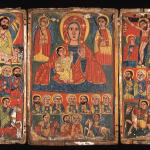Vatican City, Nov 30, 2016 / 03:04 am (CNA/EWTN News).- Alongside the various technological advances booming throughout the world, the digital age has also brought with it questions as to exactly what effect these new technologies are having on the global market, particularly when it comes to jobs. Pope Francis himself has brought up both the benefits as well as the concerns of technology on several occasions, including in his 2015 environmental encyclical, Laudato si'. Weighing these pros and cons is one of tasks he has given particularly to the Centesimus Annus Pro Pontifice Foundation, which will discuss the issue in a series of conferences to be held throughout the coming year. Established by St. John Paul II in 1993 after the publication of his encyclical Centesiums annus (which comemmorated the 100th anniversary of Leo XIII’s Rerum novarum) the foundation is designed to be a hub for thought on how to apply the Church’s social doctrine to current problems. Domingo Sugranyes Bicke, the foundation’s chairman, said that in addition to other pressing issues such as youth unemployment, human trafficking, and economic and financial crime, new technologies will be a hot topic up for discussion in the coming year. When it comes to new technologies – such as information technology, man-machine communication, bio-technologies and advanced robotics – Bicke said the effect they are having on the global market is a question “difficult to answer,” because while they exist and are growing, “they are not standardized enough” to knows exactly how they will develop or influence job creation in the future. “It’s like at the beginning when you had these new machines for textile, or these new machines for typing, typewriters, they were not standardized. Each one was different and it took a number of decades until really new technology was kind of standardized (and) you know exactly what you have to learn,” he said, noting that “this is not the case today.” Instead, people working in these new areas “are learning every day,” Bicke said, noting that the technological and digital revolution currently underway “is much deeper than probably anything we’ve known in the past,” so the questions are “much more difficult to answer.” When it comes to opportunities for new technologies to shape the job market, Bicke said he sees the most progress in projects such as “highly technological satellites,” but noted that the field is rather specific. More generally, he said new technologies are currently providing a number of opportunities in smaller-scale areas such as services that analyze and package data in quicker, more useful ways. Another area is in biology and the analysis of health data and new treatments, he said. “These are two examples where lots of things are happening, more than we know,” he said, but noted that the people doing these things might not be as visible, because “they have a lot of work” and aren’t necessarily promoting their work on television. However, one of the concerns about the promotion of new technologies is that these technologies may be taking jobs away from people. Pope Francis himself expressed concern over this point in Laudato si', cautioning in paragraph 128 that the goal of new technology “should not be that technological progress increasingly replace human work, for this would be detrimental to humanity.” “The orientation of the economy has favored a kind of technological progress in which the costs of production are reduced by laying off workers and replacing them with machines,” he said, noting that “to stop investing in people, in order to gain greater short-term financial gain, is bad business for society.” While there are certainly instances in which this has happened, Bicke said that whether new technologies are actually taking jobs from people is “the great question” of the day, but the answer is still “not clear.” “The studies are not conclusive whether the 'job fear' … is really something happening, or is it just imagination. It’s still difficult to understand,” he said. What is clear, though, is an increased growth in the availability of both “highly qualified jobs” and “unqualified jobs,” whereas those in the middle seem to “lose their chances.” Bicke said the reason for this might be that the process is “more transformative,” meaning that rather than jobs disappearing, they are simply changing. Addressing concerns, particularly in Europe, that migrants will take jobs from locals, Bicke said this “is nonsense. It doesn’t mean anything,” because job creation “is a complex thing.” “It depends on the month, it depends on technology, it depends on innovation,” he said, explaining that the current difficulty in finding jobs could be boiled down to the “general cycle” of the economy, and the fact that “we are still in a low phase of the cycle.” Unemployment, specifically among youth, was among the topics discussed at a Nov. 19 conference held by the Centesimus Annus Foundation titled “Work, Innovation and Investment: Can Precariousness be Faced?” The theme will also be carried forward during another conference the foundation will hold in January, as well as during a larger conference taking place in May which will place a special emphasis on the role of new technologies. Gathering experts on Catholic social doctrine as well as those in professional environments, the conferences are designed to build on each other and foster dialogue as to what effect “precariousness” and uncertainty have on the job market, on the economy, and on human psychology and anthropology. Also up for discussion will be how new technologies and new areas of investment “can be elements of answer to these problems which no one seems to know how to handle,” Bicke said, adding that “It’s a problem that’s very complex” since it has to do with investment, technology, and education. Solutions won’t be available overnight, he said, stressing that the discussion is one that will keep moving forward as the foundation continues to carry out its work. The people who will participate in their meetings, he said, have specific responsibilities in various businesses and organizations, and because of this can “help find solutions in their own environment.” Finding new economic and social models that are “more inclusive and more supportive of human development” is a priority for them, and is something for which Pope Francis asked during their annual meeting in May, Bicke said. He stressed the need to look for different types of alliances that could help make these models a reality, including collaboration with those from other religions. When it comes to the global economy, a change in mentality is needed, he said, noting that Catholic social doctrine has constantly insisted that “the basis of the reasoning of many economic theories is wrong, because it starts from an anthropology of the human being seen as an isolated element which only looks for its own individual satisfaction, and it’s not true.” Reality “is much more complex,” particularly because it is based on relationships, Bicke said, pointing to the importance of knowing how to build up need for solidarity and generosity in business life. “It sounds provocative, but already Pope Benedict spoke on that very, very specifically,” and “it’s still on the agenda.” Bicke said that in his opinion, some of the most urgent points to address are the need for better practical professional education, which he said is lacking throughout most of Europe, apart from Germany. However, one area that seems to be helping is entrepreneurship, which is something growing especially in the United States. “There’s a whole range of new areas where there are new companies coming up which create jobs, so part of the solution is there,” he said, noting that this is also holds true on the level of poverty. In some places where there is very little money, you see people “who become autonomous and create their own way of living,” calling this type of entrepreneurship one “practical answer” to the problem of unemployment. Read more














